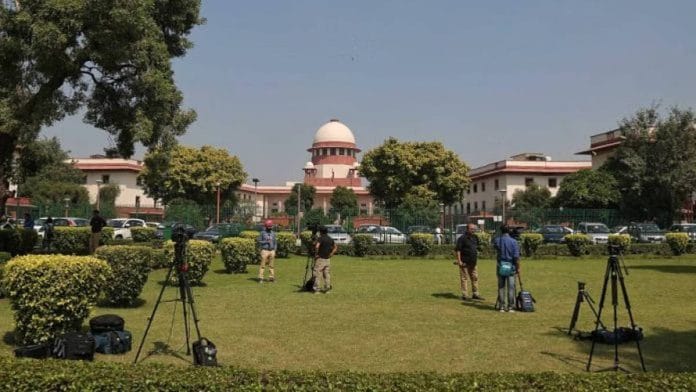New Delhi: More than 25 years after a village murder, the Supreme Court has quashed Punjab and Haryana High Court’s 2024 conviction of the accused in the case, terming the HC’s reasoning as beyond comprehension, and remitted the matter back to the court for fresh consideration.
“In spite of our strenuous efforts, we could not understand the reasoning given,” said the SC bench led by Chief Justice of India B.R. Gavai Friday.
The case pertains to the murder of Mahender Singh in October 1998, shot dead in Ahulana village, now in Haryana, for which the accused, Raj Kumar and others, were initially acquitted by a trail court in October 2002.
The trial court had accepted the alibis for Raj Kumar, Captain Anand and Yudhvir Singh, who were serving in the Army at the Bengal Engineer Group Centre in Roorkee. Records confirmed they were on duty throughout the day of murder, 17 October, 1998.
Its decision was, however, overturned by the HC on 1 October last year. It convicted the accused under Section 302 read with Section 34 of the erstwhile Indian Penal Code, holding them jointly liable for the murder, and imposed life imprisonment.
Hearing appeals against the order, the SC bench that also comprised Justice K. Vinod Chandran criticised the high court’s approach. “It is not clear what weighed with the learned division bench of the high court so as to reverse the findings of the learned trial judge,” noted the top court.
Reiterating “settled principles of law”, the SC held that interference with an acquittal is permissible only when the trial judge’s findings are “perverse and impossible”.
Accordingly, it set aside the HC order and directed it to reconsider the case in accordance with law.
Also Read: ‘How can you criminalise love?’ SC backs TN circular against hasty POCSO arrests in ‘romantic cases’
Trial court case & SC observations
The trial court’s acquittal had rested on multiple grounds, including strong doubts over the prosecution’s case. Details of the matter were laid out in the appeal filed in the SC.
Army duty records showed that accused Raj Kumar, Captain Anand and Yudhvir Singh were stationed in Roorkee on 17 October and the trial court accepted photocopies of the records authenticated by officers, noting that originals had been produced for verification.
The prosecution had alleged prior animosity from the accused against the victim: an altercation during the 1992 panchayat elections and a physical skirmish in the 1997-98 parliamentary polls. However, the trial court found these motives remote and unconvincing, noting no FIR had been reported in those disputes.
The court noted that the prosecution had failed to examine a key witness, Devender, a relative of Singh who was riding pillion with him when he was shot dead. The prosecution claimed he had been “won over by the accused”.
Furthermore, Raj Kumar was arrested on 10 November, 1998, and allegedly disclosed the location of a revolver used in the crime and empty cartridges two days later and these were subsequently recovered. But in court, Duli Chand in whose presence Rak Kumar’s statement on weapons was recorded, misidentified Yudhvir Singh as Raj Kumar, undermining the credibility of the recovery process.
The trial court also noted that four bullets recovered from Singh’s body during the post-mortem exam were only sent to the Forensic Science Laboratory (FSL) over three weeks after recovery, without explanation. The type of seal impression used on the parcel of bullets was not clearly mentioned by either the doctor or the FSL report, suggesting possible tampering.
Further, no ballistics expert was examined. The trial court thus held the FSL report inadmissible, and observed that the prosecution failed to explain why Singh’s motorcycle and a white car allegedly used in the crime were never recovered.
The appellants (convicted accused) in the SC, represented by senior advocate Siddhartha Dave, argued that the Punjab and Haryana High Court had disregarded the alibi evidence given by them, relied on questionable testimony, upheld a flawed investigation, and re-appreciated evidence without demonstrating that the trial court’s findings were perverse.
The apex court agreed, finding the HC’s approach as legally untenable.
While it refrained from assessing the case on merits, it remitted the matter back to the HC and ordered that both the prosecution and defence retain the right to raise all contentions afresh.
(Edited by Nida Fatima Siddiqui)






